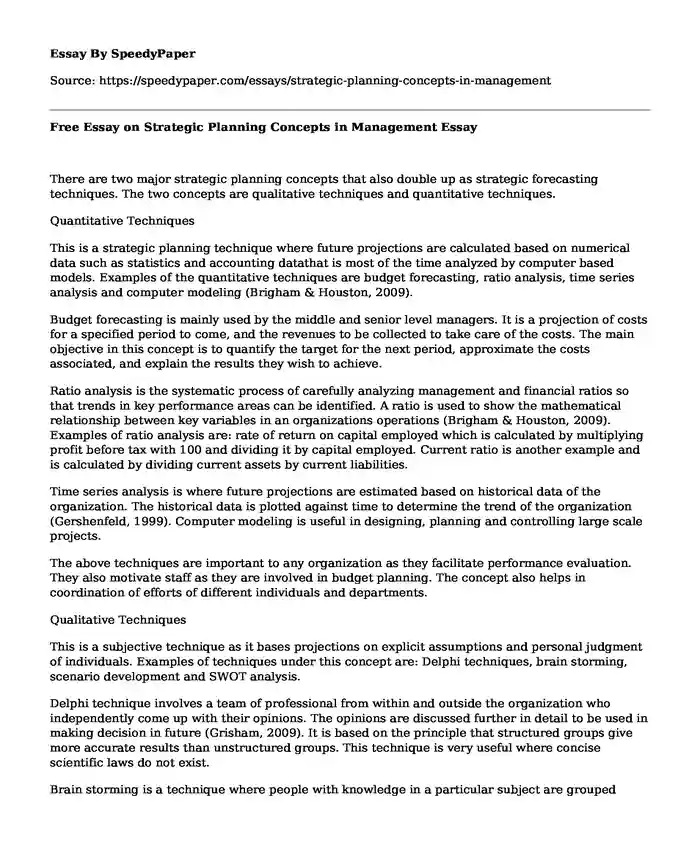
| Type of paper: | Essay |
| Categories: | Planning Management Strategy Strategic management |
| Pages: | 3 |
| Wordcount: | 623 words |
There are two major strategic planning concepts that also double up as strategic forecasting techniques. The two concepts are qualitative techniques and quantitative techniques.
Quantitative Techniques
This is a strategic planning technique where future projections are calculated based on numerical data such as statistics and accounting datathat is most of the time analyzed by computer based models. Examples of the quantitative techniques are budget forecasting, ratio analysis, time series analysis and computer modeling (Brigham & Houston, 2009).
Budget forecasting is mainly used by the middle and senior level managers. It is a projection of costs for a specified period to come, and the revenues to be collected to take care of the costs. The main objective in this concept is to quantify the target for the next period, approximate the costs associated, and explain the results they wish to achieve.
Ratio analysis is the systematic process of carefully analyzing management and financial ratios so that trends in key performance areas can be identified. A ratio is used to show the mathematical relationship between key variables in an organizations operations (Brigham & Houston, 2009). Examples of ratio analysis are: rate of return on capital employed which is calculated by multiplying profit before tax with 100 and dividing it by capital employed. Current ratio is another example and is calculated by dividing current assets by current liabilities.
Time series analysis is where future projections are estimated based on historical data of the organization. The historical data is plotted against time to determine the trend of the organization (Gershenfeld, 1999). Computer modeling is useful in designing, planning and controlling large scale projects.
The above techniques are important to any organization as they facilitate performance evaluation. They also motivate staff as they are involved in budget planning. The concept also helps in coordination of efforts of different individuals and departments.
Qualitative Techniques
This is a subjective technique as it bases projections on explicit assumptions and personal judgment of individuals. Examples of techniques under this concept are: Delphi techniques, brain storming, scenario development and SWOT analysis.
Delphi technique involves a team of professional from within and outside the organization who independently come up with their opinions. The opinions are discussed further in detail to be used in making decision in future (Grisham, 2009). It is based on the principle that structured groups give more accurate results than unstructured groups. This technique is very useful where concise scientific laws do not exist.
Brain storming is a technique where people with knowledge in a particular subject are grouped together to critically think in an attempt to project the future. Its informal nature allows the generation of unlimited imaginative ideas as it allows almost everyone to participate. It helps bond members and motivates them as they are involved in the decision making.
Scenario development is another technique that was developed due to lack of accuracy in forecasting and planning. Different scenarios may be developed with each scenario having a different set of assumptions concerning future projections. This technique is useful in cases where developments cannot be projected due to their complexity and high uncertainty.
SWOT analysis is a technique which involves making future projections based on the analysis of an organizations strengths, weaknesses, opportunities and threats. It helps an organization to look at its strength so as to take advantage of the future opportunities available in the environment (Grisham, 2009). Moreover, the organization by looking at its weaknesses can avoid or deal with its future threats.
References
Brigham, E. F., & Houston, J. F. (2009). Fundamentals of financial management. Mason, OH: South-Western Cengage Learning.
Gershenfeld, N. A. (1999). The nature of mathematical modeling. Cambridge: Cambridge University Press.
Grisham, T. (2009). The Delphi technique: a method for testing complex and multifaceted topics. International Journal of Managing Projects in Business. doi:10.1108/17538370910930545
Cite this page
Free Essay on Strategic Planning Concepts in Management. (2019, May 15). Retrieved from https://speedypaper.com/essays/strategic-planning-concepts-in-management
Request Removal
If you are the original author of this essay and no longer wish to have it published on the SpeedyPaper website, please click below to request its removal:
- Reaction Paper Example on the Freedom Writers Movie
- Learn the Sony BMG CD Copy Prevention Scandal in Free Essay Sample
- Visual Arguments Essay Example
- Project Management Plan Essay Sample
- Bullying in the Workplace - Annotated Bibliography Example
- Essay Example: Advocacy Through Legislation
- Essay Sample on Pacquiao vs. Mayweather: Fight of the Century
Popular categories




